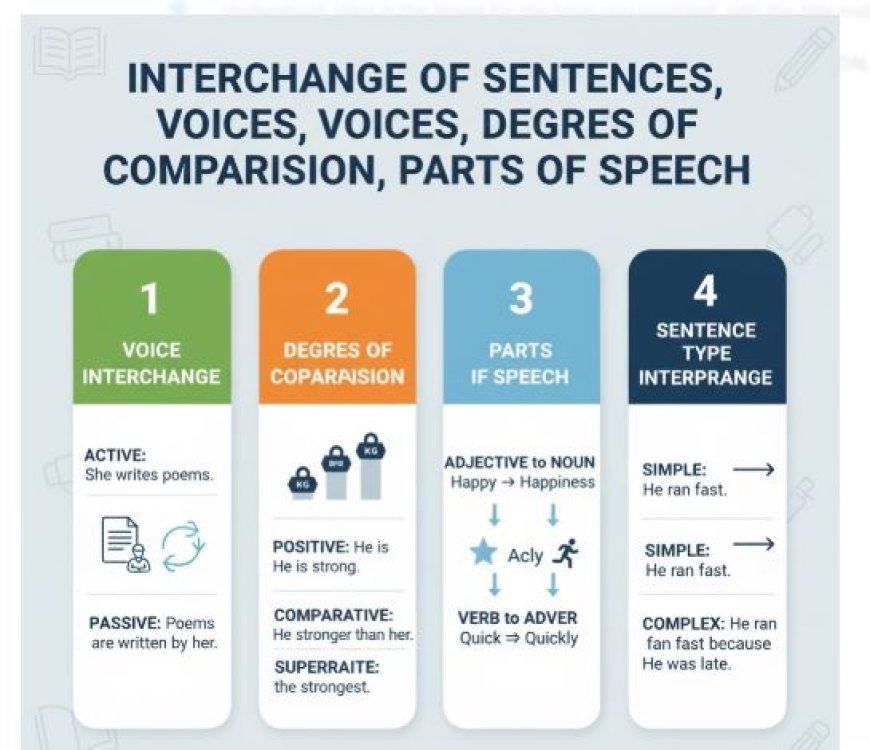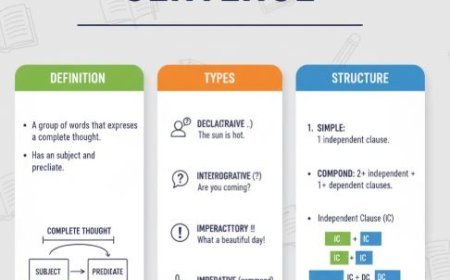INTERCHANGE OF SENTENCES, VOICES, DEGREES OF COMPARISON, PARTS OF SPEECH
Master sentence variety! Explore sentence structures, voice (active/passive), comparisons (stronger/strongest), and word types (nouns, verbs, etc.) for impactful writing

- As we continue to learn and improve our understanding of the English language, it's important to familiarise ourselves with different grammar concepts such as the interchange of sentences, voices, degree of comparison, and parts of speech.
- These are integral parts of English grammar that help us construct sentences and communicate effectively.
Interchange of Sentences
- Sentence exchange refers to the capacity to rearrange words or phrases in a sentence without affecting its meaning.
- It is a great tool for sentence creation and conveying thoughts in many ways. For example, consider the line, 'I went to the shop yesterday.'
- The words 'yesterday' and 'to the store' can be interchanged to get the following sentences: 'Yesterday, I went to the store' and 'I went yesterday to the store.'
- As you can see, the sentence's meaning stays the same despite the wording changes.
Interchange of Voices
- In the English language, there are two voices: active and inactive.
- The active voice is used when the subject of the sentence is the doer of the action, while the passive voice is used when the subject is the receiver of the action.
- The interchange of voices allows us to change the voice of a sentence while keeping the meaning intact.
- For instance, let's take the sentence, 'The cat chased the mouse.' We can interchange the voices to create 'The mouse was chased by the cat.' Both sentences convey the same meaning but in different voices.
Interchange of Degrees of Comparison
- The degree of comparison refers to the different levels of intensity or comparison of adjectives and adverbs.
- Positive, comparative, and superlative comparisons fall into three different categories.
- The interchange of degrees of comparison allows us to change the degree of an adjective or adverb without altering the meaning of the sentence.
- For example, let's take the adjective 'big.' We can interchange the degrees to create the following sentences:
- 'The elephant is big.' (positive) 'The elephant is bigger than the rhinoceros.' (comparative) 'The elephant is the biggest animal in the jungle.' (superlative)
Interchange of Parts of Speech
- Parts of speech categorize words based on their grammatical functions.
- Nouns, verbs, adjectives, adverbs, pronouns, prepositions, conjunctions, and interjections make up their composition.
- The exchange of parts of speech allows us to alter the part of speech of a word while maintaining the sentence's meaning.
- For example, consider the term 'love.' We may alter the part of speech to generate the following sentences:
- "I cherish my family." The sentence "Love is a magnificent experience" is a verb. (noun) "She wrote a heartfelt letter to express her devotion." (Adjective)
What's Your Reaction?


































